|
15 The Street
Appledore
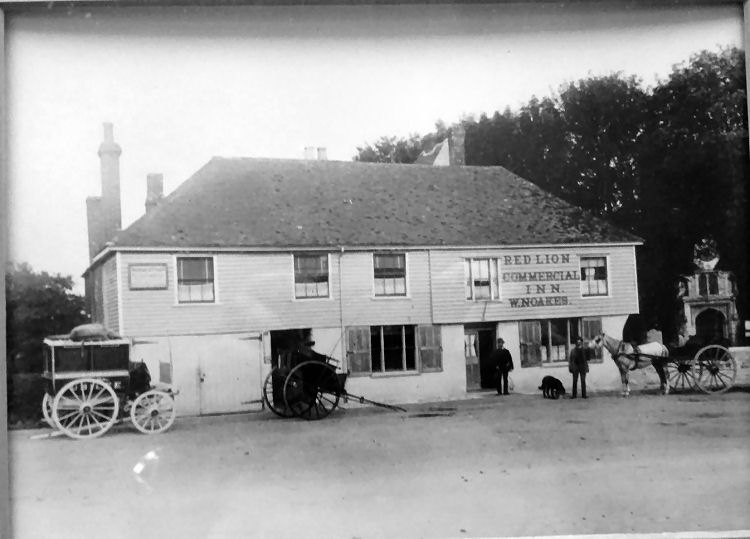
Above photo circa 1900, kindly sent by Karl Neve. |

Above postcard, date unknown. |
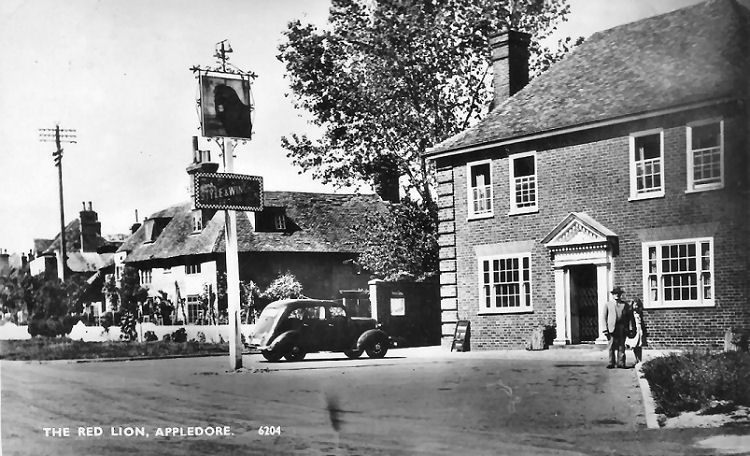
Above postcard, circa 1934, kindly sent by Rory Kehoe. |
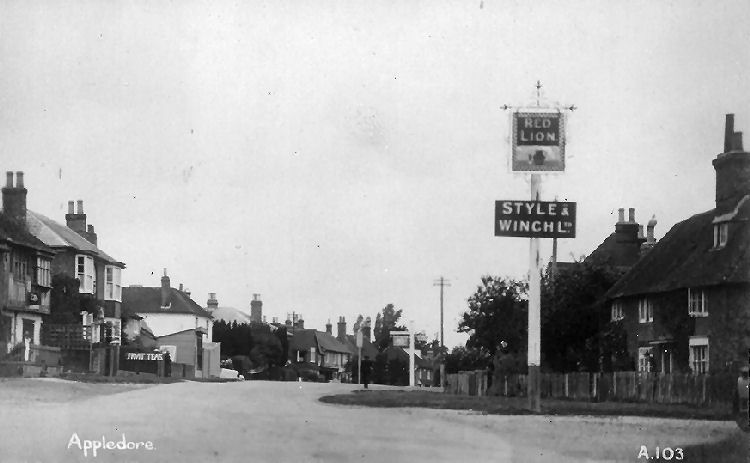
Above postcard, circa 1950, kindly sent by Rory Kehoe. |

Above postcard, date unknown, from Chris Cleave. |
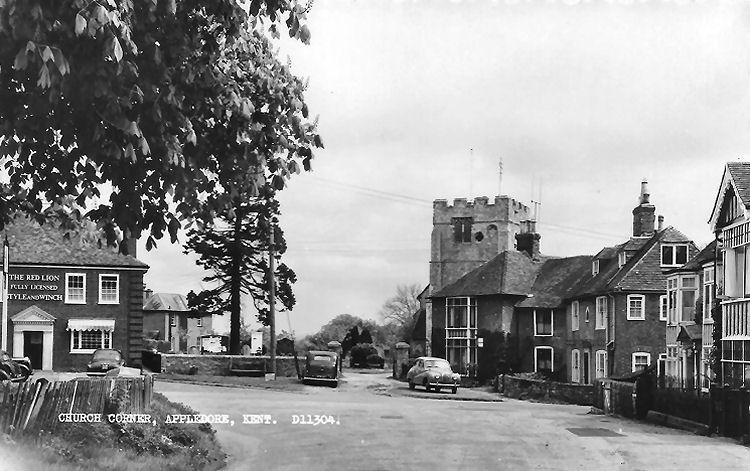
Above postcard, 1956, kindly sent by Rory Kehoe. |
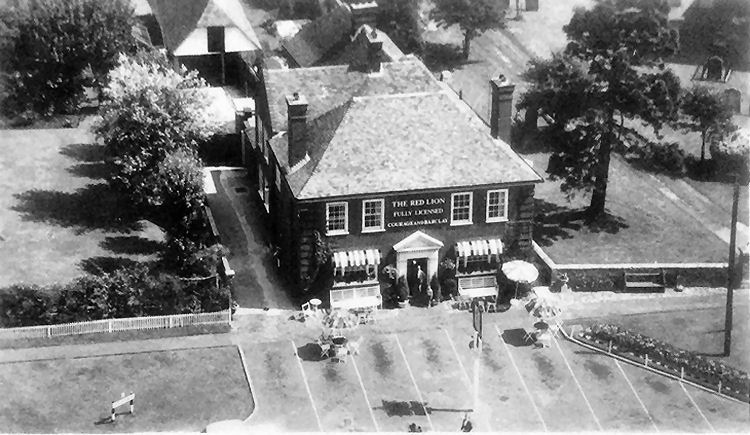
Above postcard, circa 1958. Kindly sent by Rory Kehoe. |

Above postcard, circa 1958. Kindly sent by Rory Kehoe. |

Above postcard circa 1958, kindly sent by Rory Kehoe. From "Famous
Old Inns of East Kent" the pub's description runs thus. "...This is not
an old inn but its interior is mellowed and comfortable, with a very
congenial atmosphere. The Church next door is reputed to be built on the
site of an ancient fort, demolished by the French in 1380. This fort was
probably built by the Danes, who at the time of King Alfred, sailed up
the Rother, captured the village and entrenched themselves there."
Telephone: Appledore 206. |
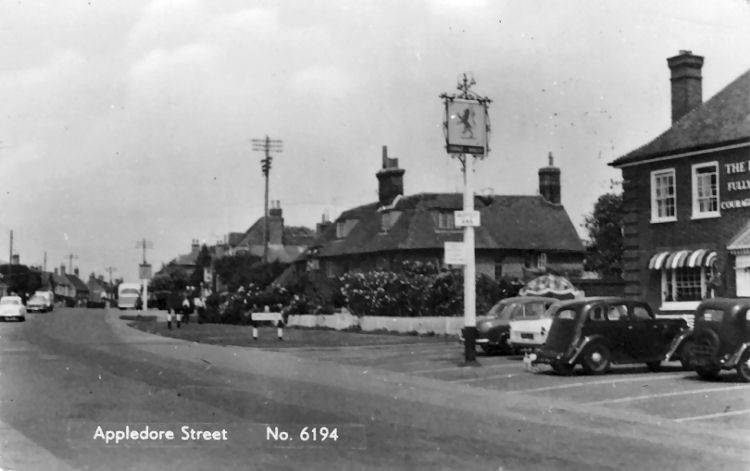
Above postcard, circa 1959. Kindly sent by Rory Kehoe. |
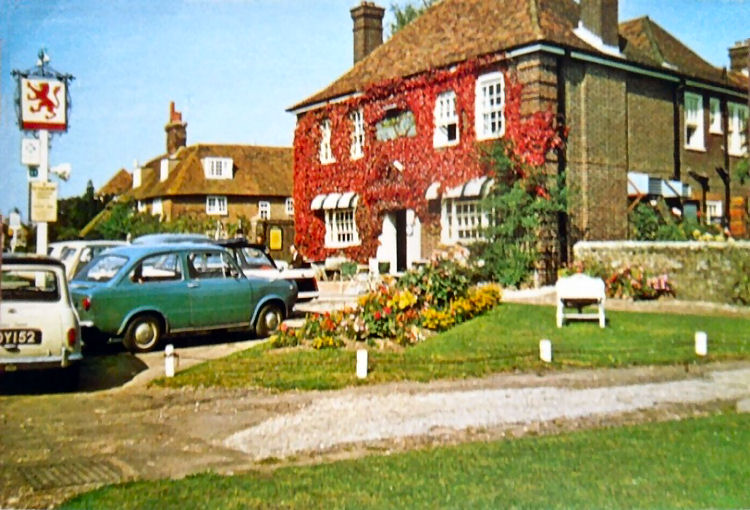
Above postcard, circa 1963. Kindly sent by Rory Kehoe. |
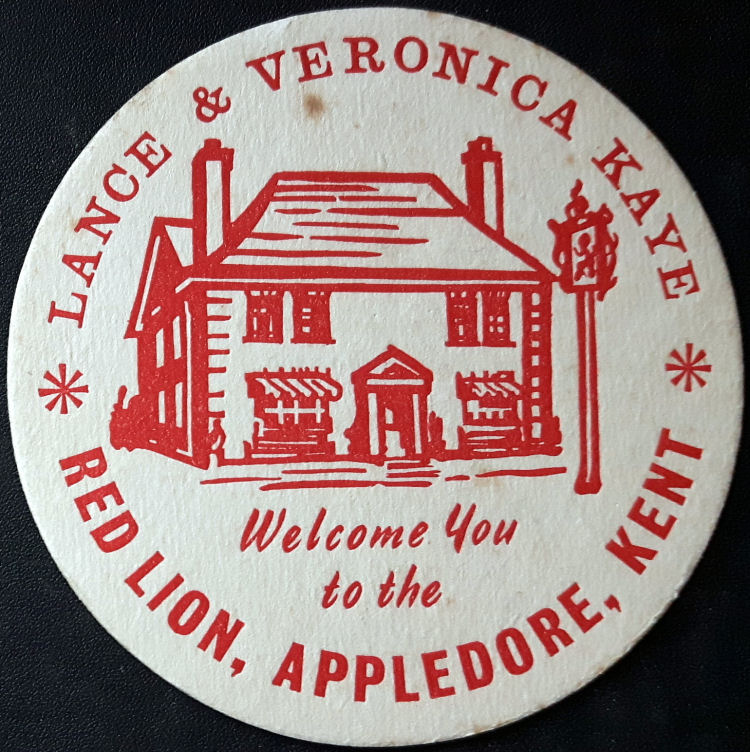
Above beermat, circa 1969, kindly sent by Mike L. |
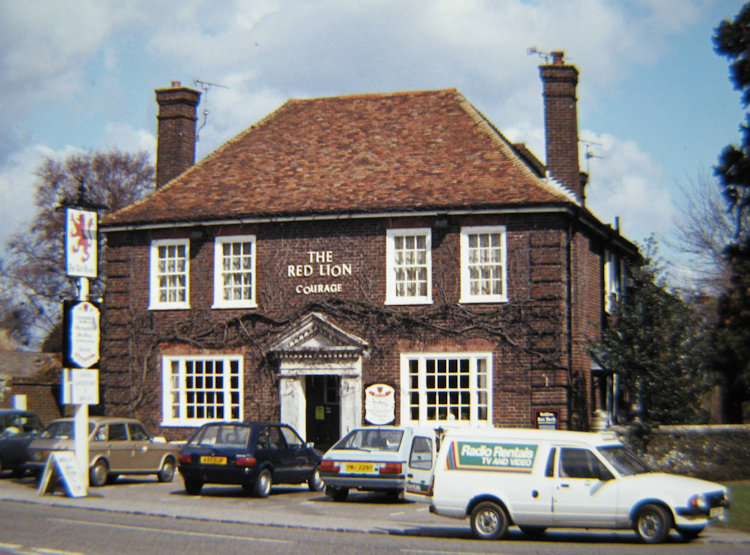
Above photo, 4 April 1986, by Jim Ashby. |
Around 1986 the pub name apparently changed colour to the "Black Lion."
I believe this happed so not to get confused with the "Red
Lion" in nearby Snargate.
|
Kentish Gazette, 2 December, 1806.
Red Lion Inn, Appledore.
Wm PACKHAM BEGS leave to inform the Public in general, he has lately
fitted up the house called the "Red Lion Inn," conveniently for
travellers, with good beds and stabling, wines &c. of the best
quality; and by due attention and moderate charges, he hopes to
merit the favours of his friends.
N. B. On Monday 22nd of December, 1806, will be his house-warming.
Dinner on table at one o’clock.
Appledore, 27th Nov. 1806.
|
|
Kentish Weekly Post or Canterbury Journal 4 August 1807.
STOLEN OR STRAYED.
From the Parish of Stone, in the Isle of Oxney, on Sunday night, the
26th July, 1807, or early Monday morning.
A Black Mare, aged, fourteen hands high, black mane and tail, two white
feet behind, rather lap eared, tail cut.
If strayed, a reward of
Half-a-Guines will be given, by giving information, so that she may be
had again, to Mr. W. Packham, "Red Lion Inn," Appledore, or Mr. J.
Watts, "Red Lion Inn," Hythe.
And, if stolen, a reward of Five Guineas,
on conviction of the offender or offenders, by apply as above.
|
|
From the Kentish Gazette, 4 December 1810.
TO SOLD BY AUCTION,
By Mr. THOS. BUTLER, UPON the Premises of the "Red Lion," situate at
Appledore, on Wednesday and Tuesday the 12th and 13th days of
December next, by order of the Assignees of William Packham,
Innkeeper, a Bankrupt — All the Stock in Trade of the said William
Packham; and also the Household Goods, consisting of leather beds,
holsters, and pillows; mahogany tables, chairs, carpeting, kitchen
furniture, and various other useful articles. And at the hour of
twelve o’clock on the first day’s sale, in one or more lots, all
that Messuage or Tenement, called the "Red Lion," now in full trade,
with the coach-house, stables, ground, and appurtenances thereunto
belonging. And likewise, all that small Messuage, Tenement, and
Bakehouse, adjoining, late in the occupation of the said William
Packham, subject to such conditions as will be then and there
produced.
The sale of the Furniture to begin each day at ten o’clock. For
particulars apply to the Auctioneer, or to Mr. Fowle, Solicitor, at
New Romney.
Dec. 8, 1810.
|
|
Western Times 28 November 1840.
MARRIAGE.
Nov. 12, at Northam, Mr. John Fisher, blockmaker, to Mrs. Fishwick,
widow, of the "Red Lion," both of Appledore.
(I have just been informed that the above
article relates to Appledore in Devon. But are leaving it here should
the same mistake be made again. Paul Skelton.)
|
|
Southeastern Gazette, 8 March 1853.
CRANBROOK. Petty Sessions, Thursday.
(Before C. T. Pattenson, Esq., chairman, the Rev. F. Barrow, T.
L. Hodges, W. P. Croughton, M. Tweedie, J. C. Schrieber, and G. R.
Stevenson, Esqrs.) The "Red Lion," Appledore, from Mr. Thos.
Riddles to Mr. J. L. Overy. |
|
Southeastern Gazette, 16 August 1853.
CRANBROOK. Forgery.
On Saturday last, a man named John Darnall was brought before the
Rev. F. Barrow, on suspicion of having uttered two Bank of England
notes. It appears that the prisoner, who is a travelling
horse-dealer, attended Appledore fair on the 27th June last, and at
about three o’clock in the afternoon he entered the "Red Lion Inn,"
kept by Mr. Overy, and asked him to cash a £10 note, at the same
time shewing several other notes, which had the effect of inducing
Mr. Overy to comply with his request. At about seven o’clock the
same evening the prisoner went again to Mr. Overy, and obtained
change for a £5 note, and on the prisoner leaving the house on this
occasion Mr. Overy asked a man named Johnson, who was standing by,
what the prisoner’s name was, and on being told he thereupon wrote
the name of John Darnall on the back of both notes, but on sending
them to the Rye bank it was discovered they were forged.
The prisoner was apprehended by Mr. Superintendent Rigg at
Crittenden, on Friday evening last, where he was found at a
public-house, and was selected by the superintendent from among
about twenty of his companions, but as the circumstances under which
the superintendent entered the house afforded the prisoner ample
opportunity to part with any thing he might have had, of course
nothing was found upon him.
As the witnesses, who live at a distance of about fifteen miles,
could not attend, the prisoner was remanded until Tuesday next.
|
|
Southeastern Gazette, 23 August 1853.
CRANBROOK.
Charge op Uttering Forged Notes.
On Tuesday last, at the magistrates’ clerk’s office, before the Rev.
F. Barrow, a cattle jobber named John Darnall, of Wadhurst, Sussex,
was charged with having uttered two forged Bank of England notes for
£10 and £5 to Mr. John Luck Overy, landlord of the "Red Lion Inn,"
at Appledore. The transaction which formed the ground of this
accusation took place at Appledore fair on the 27th June last. The
facts of the case will be best gathered from the evidence adduced
before the Bench against the prisoner.
Mr. J. L. Overy stated that on Monday, the 27th June, between two
and three o’clock in the afternoon, the prisoner went into his house
and asked him to change a £10 note, which was done. The note
produced was that changed. Witness observed the signature and the
date, and placed the note in his pocket. He had no other Bank of
England note at the time in his possession. About seven o’clock in
the evening of the same day the prisoner went again to his house,
and asked change for a £5 note, when, as witness had not sufficient
change, he sent out for it, and afterwards gave the prisoner five
sovereigns for the note. That produced was the same. He compared it
with the £10 note previously changed, and observed that the dates
were the same, as were also the signatures. He then placed both
notes in his purse, and at night deposited them both in his
cash-box. Witness had no other £5 note in his possession that day.
Prisoner subsequently asked witness to change another £5 note, which
he placed on the bar, saying that he would take two sovereigns then
and the remainder in the morning, but Mr. Overy declined to change
it for him. On handing the note from several prisoner had in his
hand, one of the notes blew away down the passage, when witness said
to the prisoner, "You don't seem very careful about your money;
there’s one just blown down." Some person picked it up and gave it
to him. The notes which had been placed in witness’s cash-box
remained there until the 23rd, of July last, and in the interval he
had no other note in his possession. On the 23rd July he gave the
notes to his brother, to pay into the Rye bank, and the same evening
they were returned, the bank declining to receive them. On the 3rd
August instant the prisoner called again at the "Red Lion," when
witness, seeing him in the tap-room by himself, immediately said,
"You’re the man I’ve been wanting to find some time." Mr. Springett,
a saddler, living opposite, was then called in to hear what passed,
and witness tendered the notes to the prisoner, saying "You’re the
man I took these notes of last Appledore fair. They are supposed to
be bad, and I wish you to cash them again." The prisoner replied,
"you’re mistaken, you didn’t take them of me; I hadn’t a note in my
possession during the fair." He also said that he bought a horse of
Mr. Cox and borrowed the money of his brother-in-law to pay for it.
Witness asked him his name and told him that he should take back the
notes. He spelt his name John Darnall, which was then written on the
back of both the notes. Prisoner asked to look at the notes, but
witness answered that as he had denied passing them, he shouldn’t
look at them for £50. On the 5th August, Mr. Overy left the notes at
the Rye bank, to be sent to the Bank of England, and on the 9th
inst. received them back through the post, marked "Forged." On the
12th instant; the notes were given to Superintending-constable Rigg.
Witness was quite positive prisoner was the same man who obtained
change for the two notes. He had many opportunities of seeing the
prisoner, both on the fair day and the day after.
On the application of the prisoner's legal adviser, the case was
then remanded till Friday last, at twelve. o’clock.
Friday:— The prisoner was again brought up, and the following
additional evidence was adduced. The prosecutor stated that on the
27th of June, when he changed the notes for the prisoner, he learned
from a man named Johnson that the prisoner’s name was John Daniel,
and he then wrote that name on a piece of paper and placed it on the
top of the notes in his cash box. He subsequently ascertained that
the prisoner’s correct name was John Darnall, and he therefore
destroyed the paper on which he had written the name as Daniel.
After the notes had been returned to him, by the Rye bank he went to
the several markets and fairs in Kent and Sussex to endeavour to
find the prisoner, but was unsuccessful, until the prisoner came to
his house on the 3rd August.
Cross-examined by Mr. Morgan, who appeared on behalf of the
prisoner:— On the 22nd July witness enclosed the two notes with
other money in an envelope, which he took himself to his brother at
Stone, and gave them to him at about eleven in the forenoon. He
received them back again on the evening of the 23rd, and after that
made enquiries where the prisoner was to be found. It was about one
o’clock on the afternoon of the 3rd August, when the prisoner came
to his house, and after he had spoken to Darnell, the latter said,
"I understand from Mr. Body that you say you took two notes from me
at Appledore fair, which are supposed to be forged?" He added that
he had come on purpose to see about it, exclaiming "Here I am; if you
say the notes are forged, why not give me in custody at once?"
Witness replied "I don’t know yet that they are forged, but they
won’t cash them at the Rye bank." Prisoner said "If you want me at
any time, I’ll write you a note in a day or two as to where I am."
He also said he would come again in a day or two. He did return on
the following Friday. Witness had never said that he took them from
a man named Guest.
Robert Overy, of Stone, out of business, deposed to receiving the
notes from his brother on the morning of the 22nd July last, and
taking them on the following day with other money to the Rye bank,
where he gave them to Mr. Bellingham, in the presence of Mr. Vidler.
The notes were not out of his possession from the time he received
them, until he gave them to Mr. Bellingham.
John Chapell Midler, clerk in the Rye bank, stated that on the 3rd
July the last witness went to the bank, and paid the two notes
produced to Mr. Bellingham, who handed them to witness, and he
returned them to John Luck Overy in the evening the same day. About
the 3rd August the same notes were brought back to be sent to the
Bank of England to ascertain whether they were forgeries. They were
returned in a few days branded "forged," and witness then enclosed
them to John L. Overy in a letter.
James Barton, inspector of Bank notes in the Bank of England, proved
that he had examined the notes produced, and both were forgeries; no
notes were issued from the bank bearing date the same day as those
in question.
Marcirus Seccombe Rigg, superintendent of police, stated that having
received the two notes produced from Mr. J. Overy on the 12th inst.,
he apprehended the prisoner the same afternoon. He read the warrant
to him, when he denied the charge. On the following day (the 13th
inst.,) he took the prisoner before a magistrate, for the purpose of
being remanded, but no evidence was at that time taken against him,
and he was cautioned by the magistrates not to say anything then.
Witness heard him say "I was not in Overy’s house the whole of that
day."
John Springett, saddler, who lives opposite the "Red Lion" at
Appledore, was called by Mr. Overy over into his taproom on the 3rd
inst., where he saw the prisoner. Mr. Overy said, "This is the man I
took the notes of." Prisoner denied it, and said he had never
changed a note at the fair, nor had he one in his possession at the
time. He had bought a horse there, but had to borrow the money of
his brother-in-law to pay for it. Heard Mr. Overy ask him how he
spelt his name, and saw the name written on the back of the notes.
John Butcher stated that at last Appledore fair, on the. 27th June,
he was called in to assist the constables. Was in the "Red Lion
from" six until half-past seven in the evening. Saw the prisoner
standing by the bar, where he received some change from Mr. J. L.
Overy. He also observed what appeared to be a Bank of England note
blown out ot the prisoner's hand down the passage, when some person
picked it up and gave it to the prisoner, who put it in his pocket.
The prisoner had other papers in his hand. Witness had previously
known the prisoner and was certain he is the same man.
David Munn, of Appledore, shoemaker, stated that at last Applodore
fair he assisted Mr. Overy as waiter, and saw the prisoner in Mr.
Overy’s house twice that day. The last time was about three o’clock
in the afternoon.
The prisoner, who declined to say anything in his defence, was then
committed for trial, but bail for his appearance was taken, himself
in £200 and two sureties in £100 each.
|
|
From the Maidstone Journal and Kentish Advertiser, Tuesday 2 December 1862.
Appledore. Root and fruit show.
On Thursday last the annual show took place in a marquee in front of the
"Lion Inn." The show was said to be inferior, both in respect of quality
and quantity of the things exhibited, to that of last year, and still
more behind previous shows. As a whole, however, the exhibition was a
credible one to the producers, and if nothing very extraordinary was
shown, there was nothing but what was deserving of commendation. An
unfavourable season prevented the roots from being what they would have
been; nevertheless the wurtzel exhibited was very fine. There were also
some remarkable large specimens in the fruit class. Of the flavour of
the desert fruits the company had an opportunity of judging after
dinner, as it was all served up. The dinner was served by Mr. Parkes's
best style. A. Cock, Esq., provided, and T. Walker, Esq., occupied the
vice-chair; and among the company were the Rev. T. N. Bourke, (Appledore),
Rev. H. B. Heyward (Sandgate), Messrs., P. P. Pollard., (sec), B. Ames,
H. Riddell, Pearson, B. Brown, Bus (Appledore), T. Elliott (Playden), J.
Catt (Rye), W. Smith (Woodchurch), Jacob Kingsnorth (Appledore), Wickes
(Woodchurch), B. Garnham (Tenterden), C. Avery (Rolvenden), J. G. Terry
"Wittersham), T. Body (Wittersham), C. Dunster (Appledore), Fullager (Woodchurch),
&c., &c. A number of toasts were drunk, and a very pleasant evening
spent.
|
|
From the Dover Express, Friday 9 May 1930.
Dover man charged with passing bad coin.
On Saturday at Ashford Police Court, before Sir Charles Igglesden.
Henry Leslie Smith (30), 8, Castle Hill Road, Dover, was charged with
uttering a counterfeit coin, reported to be a florin, to
Nellie Bean, at Appledore, with intent to defraud, well-knowing the same
to be counterfeit.
Police Sergeant W. Marshall, of Appledore, said that at 2 p.m. the
previous day he received certain information as a result of
which he went to the "Red Lion Inn," Appledore, where he saw the
accused. He told him he was a police officer and asked whether
the accused had purchased a packet of cigarettes at the Appledore
Bakery. Accuse replied, "I did." Witness asked what money he
tended in payment, and the accused said he offered a two shilling piece.
Having cautioned him, witness showed the two shillings
(produce,) and the accused said, "If I passed it, I was unaware that it
was a bad one." There was a glass of beer standing on the
counter, and witness asked whether it was the accused. He replied "It
is." Witness ask what money he tendered for it, and he
replied, "A two shilling piece." In the accused's presence, witnessed
asked the landlady to place the days takings on the counter.
This she did, there being five two shilling pieces. Witness through the
accused's attention to the one (produced) and Smith said,
"That may have been the one and, if so, I was not aware it was a bad
one. Witness took him to the Ashford police station, and at
7:45 p.m., after enquiries had been made, charged him with the offence.
Accused replied, "I do not wish to say anything."
Sir Charles pointed out that one of the "coins" had notches on it, and
witness explained that these were aware witness had tested
the coin with his teeth.
Sir Charles:- You must have pretty strong teeth!
Upon this evidence, superintendent F. J. Pattenden asked for a remand
until Friday next. This was granted, the hearing being fixed
for 10 a.m.
Asked whether he wish to apply for bail, the accused said that he did
not know anyone who would stand security. He was there
upon remanded in custody.
|
|
From Barclay, Perkin's Anchor Magazine. Volume XIII, No.9 September
1933. Kindly sent by Rory Kehoe.
THE RED LION AT APPLEDORE.
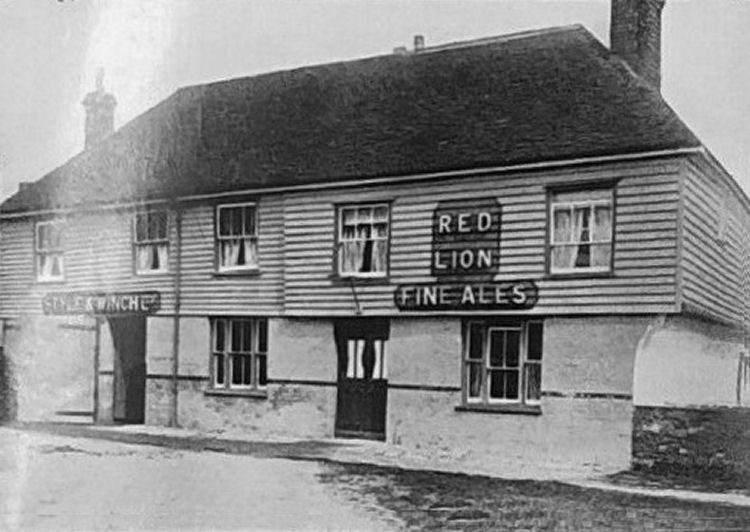
This house, like the "World's Wonder" at Warehorne, both belonging to
Messrs. Style & Winch Ltd., on the border of Romney Marsh, has recently
been reconstructed and modernised. Our photograph shows the very
striking improvements in the appearance of the news house compared with
the old. The same applies to the "World's Wonder."
A third house, the "Carpenter's Arms" at Hadlow, has also been rebuilt
but no picture of this is given as the new building is the same design
as the "World's Wonder" and is furnished and fitted with equal regard to
modern comforts.
The Surveyor's Department, at Medway Brewery, under Mr P G Searles, LRIBA,
is responsible for the design and supervision of the erection of the
three houses.
The photo captions read...
BEFORE RECONSTRUCTION...
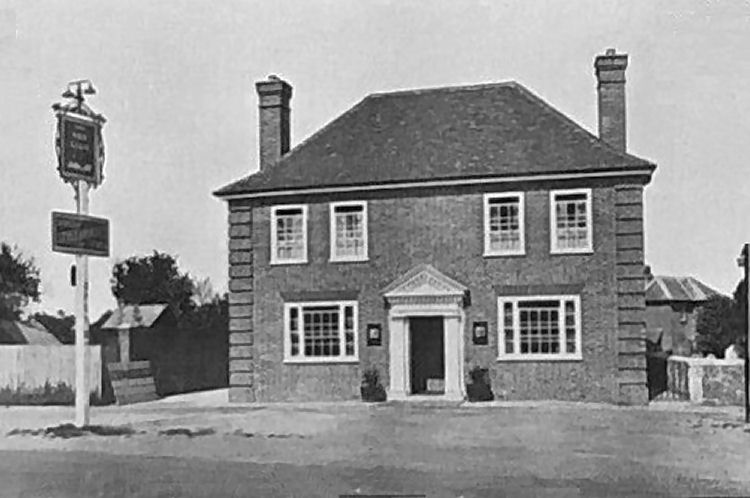
AND AFTER. |
LICENSEE LIST
PACKHAM William 1806-Dec/10
BOON William 1828+

SNOAD William 1832+

DUNSTER Ann 1841+ (age 50 in 1841 ) )
RIDDLES Thomas to Mar/1853
OVERY John Luck Mr Mar/1853+
FOWLE Walter
to 1859
PARKS Esau 1861+ (age 63 in 1861 )
(Lion Inn) )
(Lion Inn)
WOOD William 1871+ (age 33 in 1871 ) )
NEVE Walter 1874-76+
NOAKES William 1881-1911+ (widower age 79 in 1911 ) )

HARVEY Harry Mark 1922+

HOLLENSBEE Henry J 1930+

NOAKES Clifton W 1938+

KAY Lance & Veronica 1969+
https://pubwiki.co.uk/RedLion.shtml
 From the Pigot's Directory 1828-29 From the Pigot's Directory 1828-29
 From the Pigot's Directory 1832-33-34 From the Pigot's Directory 1832-33-34
 From the Kelly's Directory 1903 From the Kelly's Directory 1903
 From the Post Office Directory 1922 From the Post Office Directory 1922
 From the Post Office Directory 1930 From the Post Office Directory 1930
 From the Post Office Directory 1938 From the Post Office Directory 1938
 Census Census
|














